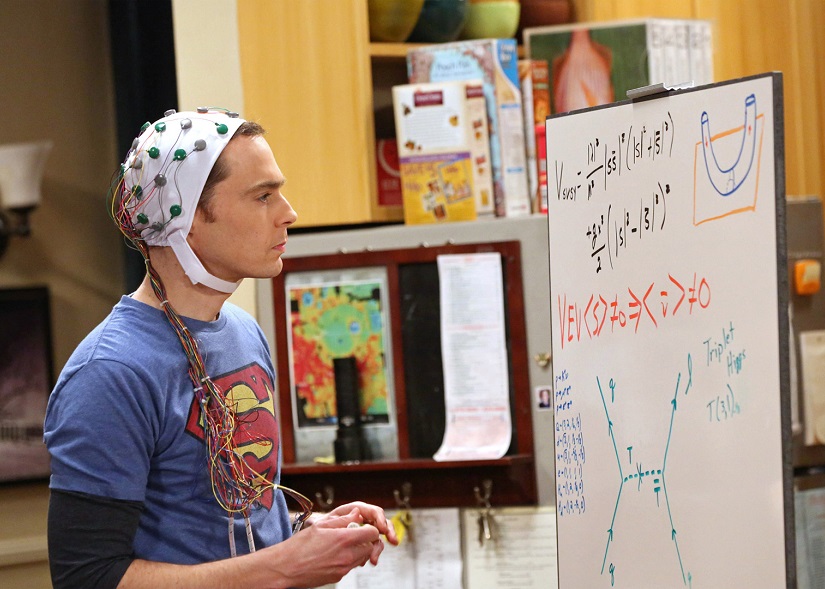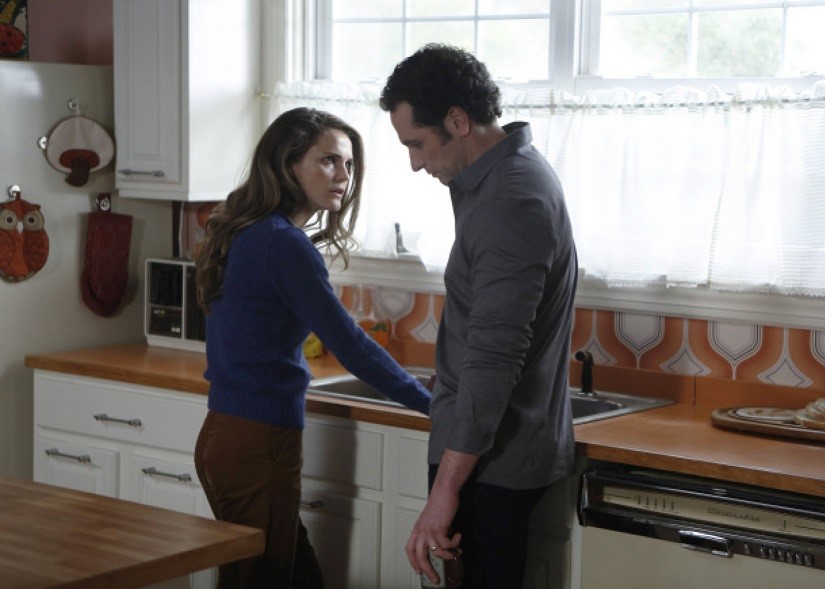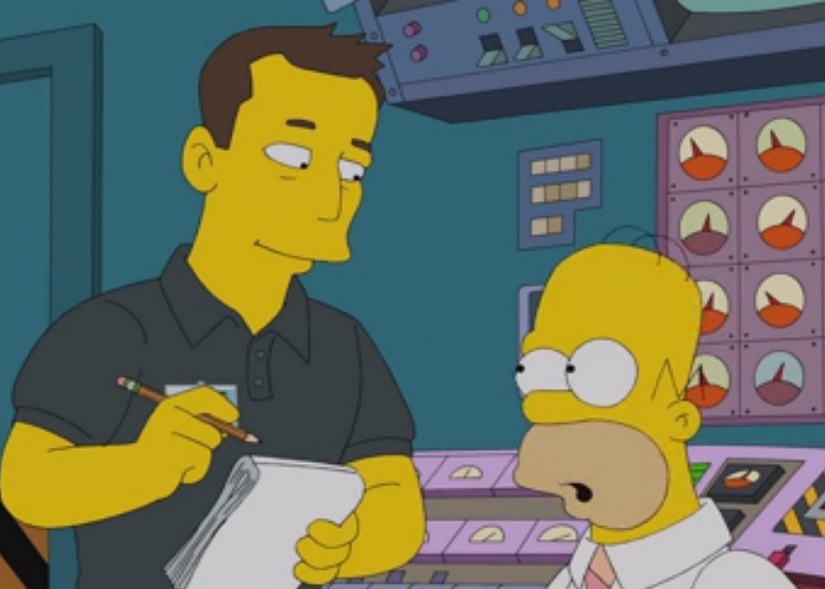This Week in TV is a new weekly feature reviewing the best, worst and most interesting episodes of television from the past seven days. The plan is to cover a wide variety of shows, but not always the same ones each week, so let us know in the comments which ones you’d particularly like to read about. This week sees icy whodunnit Fortitude debut with a feature-length episode, the first episode of The Big Bang Theory of 2015, The Americans kicking off its third season in timely fashion and Elon Musk taking over The Simpsons.
Fortitude – “Episode 1”. Fortitude, a $25 million series from British channel Sky Atlantic, marks a fairly transparent attempt at edging in on the popularity of the Scandinavian crime thriller. The show follows various key members of the community of a small town in the Arctic where the old mining industries are dying out and the mayor is pushing to commence construction on a hotel to boost local tourism. As we are reminded quite regularly, Fortitude is a town where people only come to work, so everyone has a job and therefore there is no poverty and no crime. It is, the governor says, the safest place on earth, which doesn’t exactly explain why it has such a large and well-funded police force. It also neglects the strong possibility of polar bear attack, which means every citizen must be armed with a hunting rifle at all times.
Fortitude has such a large and starry cast that even over its two-hour premiere it struggles to give many of them enough time to establish themselves. Sheriff Dan Andersson (Richard Dormer), governor Hildur Odegard (Sofie Gråbøl) and the Sutter family are given a solid amount of screentime, but everyone else is forced to make do with a handful of scenes at most. Luke Treadaway’s young scientist Vincent at first appears to be the audience surrogate, as we see him being shown around Fortitude by Christopher Eccleston’s more experienced Professor Stoddard, but both characters soon vanish into the mix, as does Michael Gambon’s tortured photographer, who appears in the first scene before largely vanishing. While life in the town is beautifully established on a visual level, with countless sweeping shots of icy tundras, its lack of attention to large swathes of its cast means it fails to establish why we should care about any of them on an emotional level. Each has a relevant point in their backstory which gets revealed, but there’s little time to find the personality quirks or the humour to cement them as interesting individuals.
This means that when the murder finally occurs, the moment relies on the audience being shocked because of who the actor is rather than through any affiliation to the character. Only Stanley Tucci’s DCI stands out in terms of personality, but that’s more down to Tucci’s naturally wry eccentricity than anything in the writing. It’s also worth noting that he doesn’t appear in the first hour at all and only midway through the second, at which point he effectively takes over the show completely. It’s an untidy switch, but one which at least gives the show some focus. There are stuble hints of supernatural weirdness, such as the appearance of a pig in a hyperbaric chamber and a defrosting woolly mammoth carcass which may or may not have brought something to the surface with it, but these are restricted to enigmatic suggestions rather than made a key parts of the established mysteries. Fortitude has all the elements of a compelling mystery, but while its technical excellence cannot be denied, it could do with thawing out its personality a little more.
The Big Bang Theory – “The Anxiety Optimization”. Big Bang attracts a lot of snobbery not only due to being an old-fashioned multi-camera sitcom with a laugh track, but an immensely succcessful one which was previously programmed against internet favourite Community. The truth is that while the show may too often go for the lazy gag or sometimes misjudge its tone, it is nevertheless an excellent example of the form which has worked hard over the past few years to meaningfully develop its central cast and iron out the more tedious habits from its early years. The addition of Amy Farrah Fowler (Mayim Bialik) and Bernadette (Melissa Rauch) to the cast in season four in particular forced the characters to emotionally mature beyond the one-dimensional stereotypes they initially were, leading to something of a creative renaissance over its three most recent seasons.
Unfortunately, that golden run has juddered to a halt in the show’s eighth season, which has struggled to find anything meaningful to do with the latest round of character evolutions – Penny getting a stable job, Raj finding a girlfriend – and too often slipped into the old habit of laughing at its characters rather than with them. Howard and Bernadette’s relationship seems to have particularly suffered: while Bernadette’s characterisation as something of a nascent supervillain has been plentifully entertaining over the years, her stubbornness has recently edged into meanness in preying on her husband’s insecurities. Similarly, Sheldon has always existed on the razor’s edge between obliviousness and obnoxiousness, yet his treatment of pseudo-girlfriend Amy has this season felt uncomfortably one-sided and manipulative. The show is at its best when the cast feel like friends you’d want to hang out with for the evening, but affectionate mockery has tended this season to slip into unpleasant nastiness.
‘The Anxiety Optimization’ just about stays on the right side of the line with Howard’s creation of the game ‘Emily or Cinammon’, which involves guessing whether a quote from Raj was said to or about his girlfriend or his dog. While it clearly frustrates Raj, there’s no sense of malice to the teasing and embraces what makes the character unique rather than targeting it, thus providing a solid well of laughs even if the conclusion – with a rare appearance by the real Emily! – is weak. In the main plot, Sheldon struggles to get to grips with his new field of study and puts into practice a theory that anxiety makes people more productive, meaning his friends get the opportunity to rile him up a little bit. While not especially funny, the plotline is rooted in another recent character development for Sheldon – his uncertainty over changing his career path – which gives it enough emotional resonance to work. It also allows Leonard, Raj and Howard to make fun of him without undermining the revelation earlier in the season of Sheldon being fully aware of how difficult he can be as a roommate, but also struggling with how much the others make fun of him because of it. With half a season still to go, hopefully ‘The Anxiety Optimization’ marks a turning point back towards the affectionate, character-based humour which has been the bedrock of the show’s best years.
(Also, Sheldon’s a Swiftie now, so there’s that.)
The Americans – “EST Men”. The Americans evolved from a gripping if overly stoic show in its first season to one of the most sophisticated and compelling shows on television in its second. Much of that success was down to a greater balance being found between the two sides of the Jennings’ lives, presenting the face of a typical happy American family on the surface while concealing their real identities as undercover Soviet agents. The show’s dramatic stakes have increased in line with Philip and Elizabeth’s inability to prevent one life from bleeding into the other, forcing them to scramble just to maintain their cover rather than, as is often the case in spy dramas, being shown as flawless experts in their field. Rather than emphasizing the characters’ strengths, we have seen them steadily become more isolated and fearful over time, struggling with dictats from superiors ever more out of touch with reality on the ground and their own conflicting desires between keeping their children safe and indoctrinating them in an ideology which even they have begun to doubt.
‘EST Men’ sees the Centre solidifying its threats to force Philip and Elizabeth to begin the process which will ultimately see their secret identities revealed to their daughter, Paige, with the aim of bringing her into the fold as a second generation spy. The dinner over which these orders are relayed is an excellent demonstration of how effectively the show balances its family drama and spy thriller elements. The Jennings’ relationship with their former handler, Gabriel (played by the great Frank Langella, sharing the screen for the first time with Matthew Rhys and Keri Russell), is warm and affectionate, right down to him playfully slapping away Philip’s hand from trying to get an early taste of the main course. That affection is quickly revealed to be as dishonest and manipulative as the Jennings’ friendship with their neighbour and FBI agent, Stan, whose home life is falling apart even as his department seems to be edging ever closer to identifying the Jennings’ secret identities – particularly since Elizabeth just gave his supervisor a good look at her face before knocking him out with his own gun.
‘EST Man’ mostly comprises table-setting for drama to come, but there’s no shortage of powerful moments that make it an engaging hour in its own right. The aforementioned dinner scene with Gabriel is outstanding, lending great symbolism to the earlier flashback to Elizabeth teaching Paige how to swim by throwing her into the deep-end of a pool. We also see how Elizabeth remains devoted to the party cause, having already laid the path for Paige’s indoctrination (“We’re getting her ready to find out who we really are”) even while Philip remains profoundly opposed. Philip sacrificing Annelise is a nasty reminder of how people are reduced to nothing but pawns in the larger political game, making it all the more terrifying that he is now expected to bring his daughter into this life. The parallels between the Soviets’ struggle in Afghanistan and the Americans’ more recent conflict in the region is played a little too obviously, but ‘EST Men’ is an excellent start for The Americans‘ third season and an inauspicious hint for the Jennings that the screws are only going to get tighter from here on out.
The Simpsons – “The Musk That Fell To Earth”. At this point, writing about how far The Simpsons has fallen from grace since its glory years feels like whipping the proverbial dead horse, or perhaps beating up the proverbial Krusty burglar. “The Musk That Fell To Earth”, while utterly mediocre rather than offensively terrible, nevertheless provides a snapshot of where the series has gone so badly wrong in recent times – assuming ‘recent’ is a broad enough term to encompass a full fifteen years of creative collapse.
The episode sees the eponymous entrepreneur arrive in Springfield in a space shuttle following a pointless cold open in which the Simpsons attempt to trap a bald eagle which has been preying on their recently installed birdhouse. You’d think the omission of the traditional couch gag would be a positive sign that the story ahead was too tightly written to be cut down any further than absolutely necessary, but alas, such meandering continues throughout an episode whose sole aim seems to be indulging its guest star in the most shameless way possible. The best episodes of The Simpsons did not need especially deep or complex plotting to succeed, but were structured intelligently enough to build an escalating sense of comic momentum through cause and effect. Here, Musk turns up in his space shuttle, momentarily finds inspiration in Homer’s dim-witted observations, teams up with Burns to turn Springfield into a futuristic, energy-efficient city (complete with Futurama tube-travel), is rejected after his ideas cost too much, then leaves. Each segment of the narrative is only loosely connected, often swapping character viewpoints to jarring effect, which prevents the gags from building on each other or feeling any more substantial than a series of non-sequiturs.
Considering the whole episode is devoted to Musk, he’s such tedious presence that the show feels the need to call him out on it even while grovelling to his genius at every opportunity. The most memorable guest stars were those which used the actor’s persona to offer a unique perspective on the characters and the world they live in. Here, as in most other cases where a guest has played themselves, the episode is requisitioned to promoting the its star’s legend (and ego) rather than the other way around. The few gentle jibes directed at Musk are quickly qualified – yes, his ideas are insanely expensive and impractical in the short term, but that’s society’s fault for not being ready for his revolutionary brilliance! – and the episode’s few laughs (“Oh god, it attracts women as well!”) come from jokes which have little to do with the main ‘plotline’, to use an exceedingly generous term. “The Musk That Fell To Earth” may not deface the characters in the way the worst episodes have over the years, but its relentless pandering to its guest star is symptomatic of a show which has long since sold out its once thrillingly nonconformist identity.



